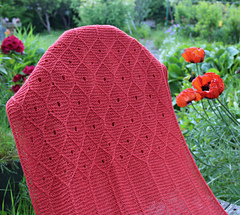patterns >  The Shawl Saturday Series 2019 and 1 more...
The Shawl Saturday Series 2019 and 1 more...
> Centaurea















Centaurea
Now Available! This is the second shawl from The Shawl Saturday Series - a surprise collection of four seasonal shawls for 2019 - with one published each season. Plus an extra bonus pattern added in 2020.
The collection is priced at £13.00 for five patterns (plus hand illustrated inspiration notes) - a saving of 35% on the price of five separate shawl patterns! Please note that this price does not include any sales tax (e.g. VAT) that may be added depending on where you live.
“I’m staying out for the summer, playing games in the rain. The hills and the fortune, got me fooled again…” ‘Staying Out For The Summer’, Dodgy, 1994
How do you know that summer is here? Being able to wear your sandals non-stop? Certain flowers coming into bloom? Late sunsets? Warmer weather? Spending more time outside or going away on holiday?
The Centaurea shawl is partly inspired by the sort of tessellating patterns that you might see on holiday (think swimming pools, visits to historic buildings, cobbled streets) and the geometric patterns seen in nature, especially that of the centaurea family of plants (cornflower, knapweed, and starthistle, just to name a few).
Knitted in a light summer yarn, Centaurea is the perfect drapey accessory for the warmer months, and features a gorgeous lattice fringe, which is both fun to make and to wear.
CONSTRUCTION NOTES
Centaurea is knitted flat in one piece and features relaxing garter stitch, slipped stitch patterning, whilst innovative travelling stitches are used to create geometric patterns. You’ll find the development and appearance of these tessellating shapes really interesting: they grow out of each other and interconnect, just as tiles do. Once the knitting is finished, a lattice fringe edging is created along both short edges.
Video tutorials are included to explain how to work the increase/decrease stitches and also how to make the lattice fringing.
YARN
Holst Garn, Coast (light 4 ply / fingering-weight; 350m / 383 yards per 50g cake ball; 55% Merino lambswool, 45% cotton) 3 cake balls in Jaffa
NEEDLES & NOTIONS
3.5 mm / US 4 circular needle, 80 cm (32”) long
(straight needles could also be used)
8 lockable stitch markers (optional), tapestry needle, blocking pins (wires optional), & crochet hook for fringing
GAUGE
22 sts x 42 rows = 10 cm / 4” measured over patt, before blocking
19 sts x 34 rows = 10 cm / 4” measured over patt, after blocking
SIZE
141 cm / 55.5” wide x 55 cm / 21.75” deep

26865 projects
stashed
24980 times
- First published: June 2019
- Page created: June 8, 2019
- Last updated: September 9, 2025 …
- visits in the last 24 hours
- visitors right now





